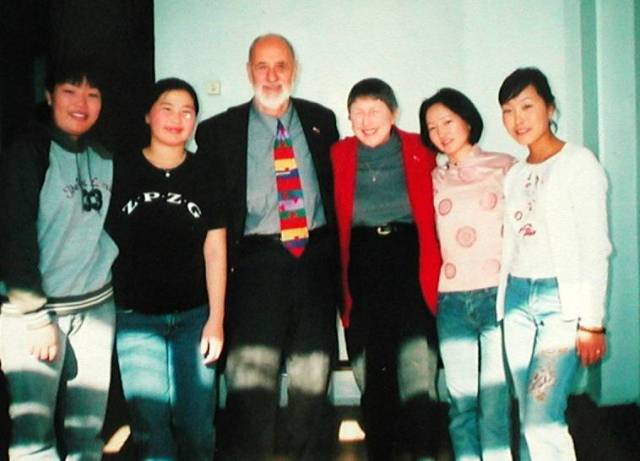 |
| HOME | GLOBAL | DISTRICTS | CLUBS | MISSING HISTORIES | PAUL HARRIS | PEACE |
| PRESIDENTS | CONVENTIONS | POST YOUR HISTORY | WOMEN | FOUNDATION | COMMENTS | PHILOSOPHY |
| SEARCH | SUBSCRIPTIONS | JOIN RGHF | EXPLORE RGHF | RGHF QUIZ | RGHF MISSION | |
|
|
|
|
|
View from Abroad: Mongolia
Sitting in our two bedroom apartment on the third floor (with no elevator, of course), watching television in English from Korea, China (CCTV), England (BBC World), India and America (Voice of America), you get a view of our country which is valuable and special. In fact, there are at least a dozen television stations from China (half in dialectics in Chinese and one in Spanish, French, German, Russian, Mongolian and English). It seems that the Chinese understand that the next battle in the 21st century is for minds, not lands to conquer; information as weapons, not guns; and gross national products, not gross exaggerations of what is happening in the world. Last year was the year of China in France and this year it is France in China. The two nations traded cultural treasures and cultural understanding. Artists filled the airways, not just politicians (although there was plenty of politics also). Korea is battling Japan and China for a market in this small, young country of 2.5 million people who are struggling successfully to build a democracy.
I asked a friend why the Mongolian University of Culture and Arts (where I am helping with curriculum development and fund raising/grant writing) was emphasizing English in their new arts management curriculum. The answer was very Asian: “English is the current money language.”
“What do you mean by current?” I continued.
My friend smiled and answered, “It may be Chinese or Korean or Japanese in the future. They could take over as the “money language”. The Asian market is growing faster than the American market. Your present leadership is trying to win markets by spreading democracy through guns. We see democracy being spread by opening new markets for our products. Even the Chinese government (as you know, the Mongolian people were occupied by China for 200 years but never conquered) has changed in its attitude toward free enterprise. You acquire Hong Kong and not change attitude. Beijing is open now to information. The Chinese have centuries of moving with the flow of change (as do we in a different way here in Mongolia).”
“But America is still the top economy in the world,” I continued. “And so we study English now,” he said. “We have a population which is young. Sixty-seven percent of our people are under the age of 35. They are moving out to South Korea (the eighth largest economy in the world), Japan (the second) and China (the third) for “mind jobs”, high-tech employment. Those three nations have an aging population (which will change but our young people will gain employment while they adjust).”
At another occasion, our talks centered on why the Mongolians had survived with their culture in place after the occupation of the Chinese and the Russians. My friend was cryptic: “We are a nomadic people in fact and spirit. If you own little of outside possessions but value much in spiritual, inside life (Mongolia is 96% Buddhist), what can a conquering nation take from you?”
With that one description, I understood something about Mongolia that had interested my mind: What did the Mongolians, living between the Gobi desert and the high, cold mountains find in this land? It had some valuable minerals but not many other natural treasures (except leadership that created Genghis Khan who conquered the largest known world of the 12th and 13th century)? It was the nomadic life style that had helped these people to survive the occupying forces.
It is a lesson that America could learn from this small nation. What you have inside cannot be taken from you by conquering hordes or terrorists if you do not let it happen? Outside things and situations can change but they do not count. Materialism cannot replace the spirit of a people. I remembered that we had it after 9/11. I question now, seeing America from Ulaanbaatar, the capital of Mongolia, whether the Bush administration has eroded it by turning to violence as a way to bring democracy to the Middle East. |
| RGHF peace historian Joseph L. Kagle, Jr., 2006 |
